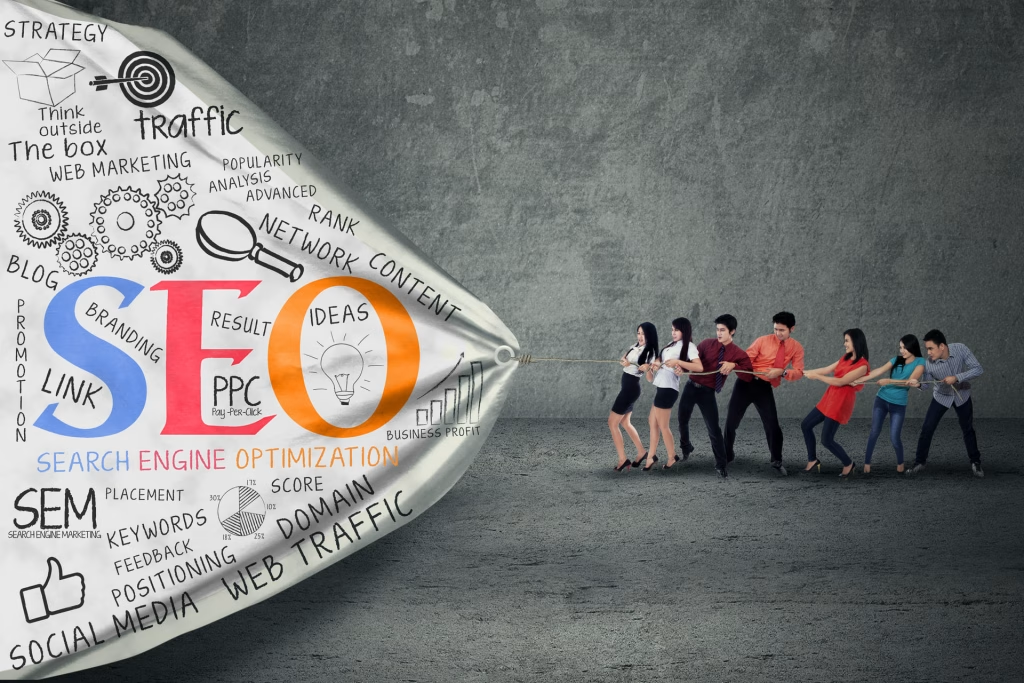Are SEO Services Still Worth It in 2025?
TL;DR – Quick Summary
- SEO isn’t dead-it’s evolved. In 2025, it’s not just about ranking on Google, but about being cited in AI-generated answers.
- Generative Engine Optimisation (GEO) is the new game: optimising for AI systems like ChatGPT, Perplexity.ai, Google SGE, and Bing Copilot.
- Tools like Frase, AlsoAsked, Clearscope, and SGE Labs help monitor AI visibility.
- The goal: be the source AI trusts. Structure content semantically, target natural queries, and build topical authority.
- SEO services still matter, but only if they’re AI-aware, future-ready, and focused on visibility, not just traffic.

In this article:
The Real Question: What Is SEO Worth in the Age of AI?
“If AI answers everything, why would anyone click?”
It’s a fair question-especially for professional service firms, consultancies, e-commerce, and tech brands who rely on digital visibility to win trust and new business. With Google’s AI Overviews, ChatGPT Search, Perplexity.ai, and other AI-first platforms transforming how people discover information, traditional SEO can feel obsolete.
But here’s the truth:
SEO isn’t dead—it’s evolving. Dramatically.
And in many ways, the bar is higher than ever.
Today, it’s not just about ranking #1. It’s about being referenced, cited, and surfaced in AI-generated answers. For law firms, consultancies, and tech companies, this means your expertise needs to be visible where your clients are searching, even if that’s not on your website.

From Rankings to References: The New SEO Reality
The old goal was clear: get to the top of the ten blue links.
Now? Search results are often AI-generated answers, synthesised from multiple sources and presented in full-page summaries. You don’t need to rank #1 anymore. You need to be worth citing.
Welcome to Generative Engine Optimisation (GEO)—or what some call Reference SEO.
Modern AI systems like ChatGPT-4, Gemini, Perplexity.ai, and Bing Copilot scan the web to synthesise answers from multiple sources. They don’t just rely on rank—they look for:
- Fresh, well-researched content
- Clear structure (semantic HTML, schema, headings)
- Established topical authority
- A distinct, trustworthy voice
If your content ticks those boxes, it stands a real chance of being referenced—even if it’s buried on page two or three.
Learn how our Technical SEO Services ensure your content is structured for optimal AI readability.
Why SEO Services Still Matter—More Than Ever
You might wonder: If the rules have changed, are SEO services still worth the cost?
The answer is yes—but only if those services have evolved with the times.
The best SEO professionals today are doing far more than keyword stuffing or basic optimisation. They’re:
- Rebuilding websites for machine readability (fast, semantic, mobile-first)
- Creating content designed for both humans and LLMs (large language models)
- Earning citations from trusted domains—essential in AI summaries
- Shifting KPIs from “traffic” to visibility, mentions, and authority
Discover our comprehensive On-Page SEO Services that enhance content quality and user experience.
How to Optimise for AI Visibility: A Step-by-Step Approach
Whether you’re a law firm, consultancy, or tech company, here’s how to future-proof your SEO:
1. Structure for Semantics
Use proper heading hierarchies (H1 > H2 > H3), schema.org markup, and accessible HTML. LLMs scan this structure to extract context and relevance.
2. Target Conversational, Long-Tail Queries
People are now talking to search. Optimise for natural, human-sounding phrases like:
“How do I choose the best personal injury solicitor near me?”
These are the queries AI is designed to answer directly.
3. Establish Topical Depth
Publishing one blog post per topic won’t cut it. You need clusters of content that demonstrate genuine expertise in your niche. For instance, a law firm could create a series on different aspects of family law, while a SaaS company might build a knowledge base covering every feature and use case.
4. Design for Skimmability
AI (and humans) favour content that’s easy to parse:
- Bullet points
- Short, direct paragraphs
- Internal anchors
- Infographics and data visuals
- Table of contents (for LLM parsing + UX)
5. Measure the Right Metrics
Traditional rankings still matter, but new KPIs are rising:
- Featured snippet appearances
- Citations in AI Overviews
- Brand mentions across trusted sources
- Time spent on page, not just bounce rate
Our SEO Audit Services can help identify areas for improvement.
Tools & Resources for GEO
- Frase: Optimises content for AI by analysing top SERP and AI answers.
- AlsoAsked: Reveals related questions people ask, perfect for targeting conversational queries.
- Clearscope: Ensures your content covers all relevant topics and keywords for topical authority.
- SGE Labs: Monitors your visibility in Google’s Search Generative Experience.
How AI Systems Choose What to Reference
AI models use a blend of criteria to determine what content gets surfaced in generative results:
- Clarity & Conciseness: Is this answer scannable and summarised easily?
- Topical Relevance: Is it laser-focused on the intent of the query?
- Domain Trust: Does the site consistently publish accurate, up-to-date content?
- Formatting: Clean HTML, schema, and headings = easier parsing and quoting.
- Diversity of Sources: AI aims to blend perspectives, not echo one voice.
The implication?
You can no longer trick the algorithm—you must earn your visibility.
A Note on Over-Optimisation
In trying to “write for AI” many sites lose their voice. If everyone optimises the same way, AI results become flat—and AIs notice.
Be structured but stay human.
A unique tone + useful insights = higher citation potential.
Don’t Fall for the “SEO Is Dead” Myth
SEO is not obsolete—it’s just less visible. In fact, AI models often cite high-quality content that doesn’t rank #1.
That means:
- Quality trumps keyword density.
- Structure beats backlink volume.
- Trust outweighs traffic.
The question is no longer, “Where do I rank?” but rather: “Am I the kind of source AI trusts enough to quote?”
Quick FAQ: SEO in the AI Era
Q: Will AI kill all organic traffic?
A: No-but it will change how traffic arrives. Brands referenced by AI will see increased authority, trust, and indirect traffic.
Q: Is traditional SEO dead?
A: Not dead, but evolving. The fundamentals (great content, technical health, authority) matter more than ever.
Pro Tip: Focus on E-E-A-T
To increase your chances of being cited by AI systems, focus on Experience, Expertise, Authoritativeness, and Trustworthiness (E-E-A-T).
Build your brand, showcase credentials, and keep your content accurate and up-to-date.
The Verdict: Are SEO Services Worth It in 2025?
Absolutely. But only if they’re built for the AI era.
SEO in 2025 isn’t about chasing keyword rankings or backlinks alone. It’s about engineering your content and website to be cited, referenced, and trusted by AI-driven search engines and assistants.

Modern SEO services are worth the investment if they:
- Embrace AI and GEO: They understand how generative engines work and how to optimise for them.
- Prioritise Authority and Trust: They build your brand’s expertise and credibility, making you a go-to source for both humans and machines.
- Focus on Visibility, Not Just Clicks: They track mentions, citations, and references across AI platforms-not just traffic.
- Stay Technically Excellent: They ensure your site is fast, structured, and machine-readable.
In the AI era, being findable isn’t enough. You have to be referenceable. Choose SEO partners who are future-ready, and you’ll stay ahead of the curve.
Ready to Future-Proof Your SEO?
Audit your site for AI visibility, experiment with GEO tools, or contact our team for a strategy session.
Stay referenceable! Stay ahead!
Related
Articles


![Identifying and Managing Fake Google Reviews [2025]](https://www.agiledigitalagency.com/wp-content/uploads/2023/06/Buying-Google-Reviews-Trust-and-Credibility-Issues.jpg)